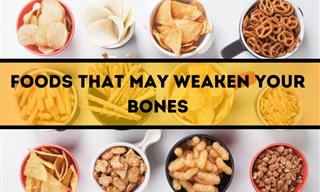If you're looking to build strong bones, adding prunes to your diet can be extremely helpful. Recent research indicates that prunes, known for their digestive benefits, may also contribute to bone health. A study published in Osteoporosis International revealed that daily prune consumption can help slow down bone loss and reduce the risk of fractures.
This finding challenges traditional notions about bone health and introduces prunes as a potential dietary addition for stronger bones.

“This is the first randomized controlled trial to look at three-dimensional bone outcomes with respect to bone structure, geometry, and estimated strength,” says Mary Jane De Souza, a distinguished professor of kinesiology and physiology at Penn State, in a media release. “In our study we saw that daily prune consumption impacted factors related to fracture risk. That’s clinically invaluable.”
Related: 10 Mighty Tips to Ensure Your Bones Stay in Top Condition
Our bones are in a constant state of renewal, with old bone tissue being replaced by new. However, this process slows down as we age. The body becomes less efficient at rebuilding bone, potentially leading to bone health concerns.
Postmenopausal women face a higher risk of bone loss compared to younger adults. Osteoporosis is more prevalent in this group.
Osteoporosis is a disease of the bones that occurs when bone mineral density and bone mass decreases or when the structure and strength of the bones change. It affects one in three women and one in five men over the age of 50. Women in this age group are at a heightened risk of developing osteoporosis due to decreased estrogen production, which plays a key role in preserving bone mass. This increases the likelihood of fractures.
Research has established a link between prunes and enhanced bone health. Osteoporosis currently has no cure, and many people do not use medications to manage the condition. Prunes provide an affordable and readily available option for maintaining optimal bone health. Rich in bioactive compounds like polyphenols, prunes have the potential to inhibit inflammatory pathways associated with bone loss.
Measuring how prunes affect bone health
To understand bone health, researchers have previously used DXA scans to measure bone density. While helpful, DXA scans have limitations in providing a complete picture of bone health. They cannot differentiate between various bone tissues or assess the overall strength and quality of the bone structure.

Bone mineral density tells us how much calcium and other minerals are stored in our bones. However, to fully understand bone health, we need to look beyond just density. Examining the bone's structure, shape, and internal makeup provides a clearer picture of overall bone health, explains De Souza.
Researchers conducted a year-long study to investigate the link between prune consumption and bone health in postmenopausal women. Participants were divided into three groups: a no-prune control group, a group consuming 50 grams of prunes daily, and a group consuming 100 grams daily. Bone density, geometry, and strength were measured using a peripheral quantitative computed tomography scan every six months.
Results

Results showed that women who regularly ate prunes experienced improved bone density and strength, particularly in the shinbone. This was especially evident in those consuming at least four to six prunes daily.
The study suggests consuming four to six prunes daily for optimal health benefits. While increasing the intake to ten to twelve prunes might offer additional benefits, researchers found that participants in this group were more likely to discontinue the study due to consumption fatigue.
“It’s pretty exciting data for a 12-month study,” De Souza continues. “We were able to maintain and preserve bone at the weight-bearing, cortical bone of the tibia and the maintenance of cortical bone and bone strength is key to avoiding fracture.”
The new study suggests that prunes may benefit bone health, especially in older adults and postmenopausal women. While more research is needed to fully understand the extent of these benefits, including the potential to reduce osteoporosis risk, the findings offer promising insights into the fruit's nutritional value.
Related: Aching Joints or Bones? 7 Herbs That Will Make Them Strong
Are there any other health benefits to eating prunes?
Prunes have long been considered a natural remedy for constipation. Research supports this claim, showing that increased prune consumption can improve bowel regularity. However, like any food, prunes might cause digestive discomfort for some individuals. On the other hand, prunes have also been linked to heart health benefits, including improved cholesterol levels and reduced inflammation.
 Go to BabaMail
Go to BabaMail






















































